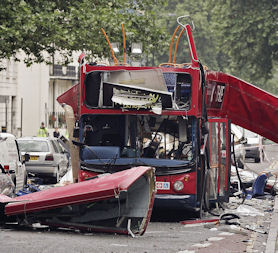London bombings: coroner rejects MI5 secret sessions
The London bombings inquest coroner rules MI5 intelligence cannot be heard in closed sessions. Home Affairs Correspondent Andy Davies says the government may invoke special powers to replace inquests.
<!–
–>

Lady Justice Hallett rejected arguments by lawyers for MI5 that she had powers to exclude the bereaved families from hearings so she could examine highly sensitive documents which would damage national security if made public.
But she said she would not allow the inquest to put lives at risk and said the secret evidence could be edited to remove names of sources and other confidential information.
“I am still hopeful that with full co-operation on all sides, most if not all of the relevant material can and will be put before me in such a way that national security is not threatened,” she said.
Lady Justice Hallett, an appeal court judge appointed as assistant deputy coroner to hear the inquest for the 2005 attacks on London, also ruled that she had the power to consider covertly obtained material but could not rely upon it as evidence.
The 7/7 families and survivors won a victory earlier this year when Lady Hallett ruled that the hearings should examine alleged failing by police and MI5.
The government could invoke special powers to replace 7/7 inquestsEarlier this year MI5 had attempted to argue that the Coroner had no legal right, effectively, to allow these inquests to examine the issue of so-called preventability, writes Channel 4 News Home Affairs Correspondent Andy Davies, namely whether there is anything the intelligence services could reasonably have done to prevent the bombings.
The argument, in essence, was that such a move would be impractical, unfair and a danger to the country. They lost that argument and so went back to the Coroner to argue that she adopt a process whereby only she could examine the most highly sensitive evidence.
Again arguments of national security and fairness were put forward by MI5's legal team, but again the Coroner was not persuaded. MI5 can seek to challenge this ruling in the High Court, but another option, albeit potentially hugely controversial, is available. The government could invoke special powers to replace these inquests with a public inquiry, which could allow MI5 to have its most sensitive evidence heard in secret. But if that measure was adopted, as Lady Justice Hallett made clear today, it could effectively lead to the hearings having to be started again from scratch.
The families, said the coroner, "have had to suffer the distressing experience of hearing witnesses speak of the death of their loved ones in all too graphic terms...they would not wish to relive that experience".
Open evidence
Some of the bereaved relatives want to ask security service officials why they did not follow up plot ringleader Mohammed Sidique Khan and his right-hand man, Shehzad Tanweer, after surveillance officers watched them meeting known terror suspects 17 months before the bombings.
MI5 argues this is both unnecessary and impossible because doing so would require the disclosure of top secret intelligence files.
Lady Hallett, who is sitting without a jury, was asked to make a ruling on whether she could hold closed hearings from those which involved in the inquest could be excluded.
I do not intend to endanger the lives of anyone. I do not intend to allow questions which might do so. Lady Justice Hallett
The coroner said today that she had powers under Rule 17 of the Coroners Rules 1984 to exclude the public from the inquest if it was in the interests of national security.
But she concluded that this did not allow her to hold closed hearings without interested persons being present, as lawyers for MI5 and the Home Secretary had argued.
“I am all too aware, given the events of the weekend, of the unenviable task facing the security services,” she said.
“I repeat, sources’ names may be withheld, redactions made.
“I do not intend to endanger the lives of anyone. I do not intend to allow questions which might do so.
“I do not intend to allow questions which I know to be based on a false premise or which I know to be misleading.
“There may be times when the parties will simply have to accept my ruling without demur. I may have to forbid certain questions, I may have to rephrase them.
“Finally I wish to emphasise, I do not intend to make findings adverse to the security services which I know to be false.”